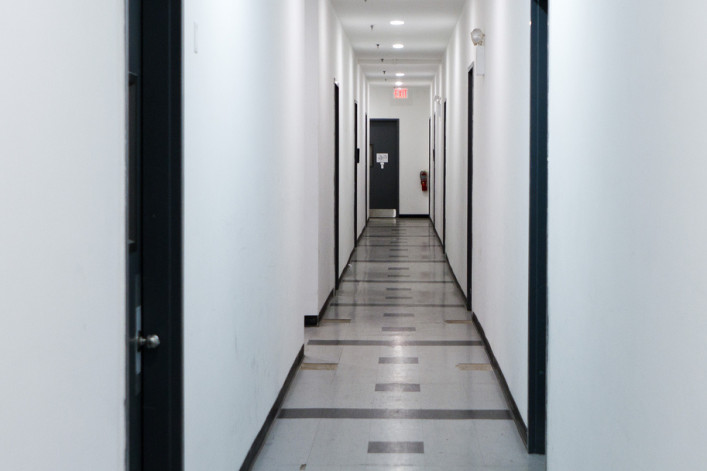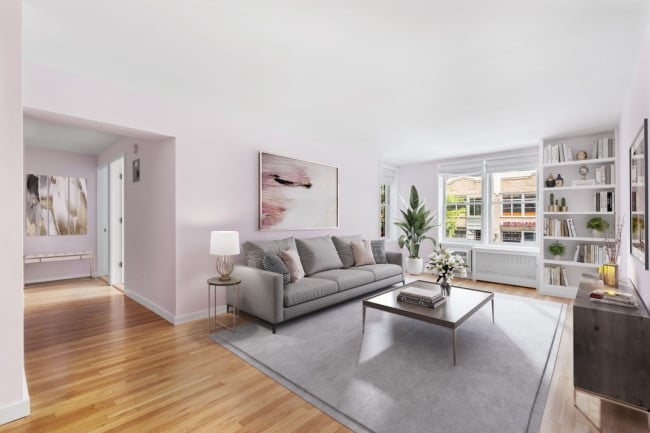4 essential steps to buying the apartment next door

If you own an apartment in New York, there's a good chance you've fantasized about expanding into the apartment next door.
New Yorkers tend to be on a never-ending quest for more space—never-ending, because in a city of 8 million people with the highest housing costs in the country, there's not enough of it to go around. Even people who already own their apartments often fantasize about an upgrade, but the cost, and the process of selling your apartment and buying a new one, and maybe even having to rent in between, are big deterrents.
The low-hanging fruit when it comes to daydreams about spreading out is the apartment next door. Maybe the neighbor is always spending time out of town for a job, or is getting older and thinking about moving, or maybe you don't know the neighbor at all. Whatever the case, you think to yourself, one day the square footage on the other side of that shared wall could be yours.
Before you approach the neighbor—and to get the apartment before it hits the market—here are some key pieces of strategy you should think about, from real estate pros who've facilitated these kinds of purchases and, in some cases, done it themselves.
1. Get to know your neighbors, if you haven't already
To buy the neighbor's apartment, you'll first need to get to know the neighbor, and get on good terms with her.
And if you're tight with the neighbor, it couldn't hurt to propose making a pact of sorts.
"Tell them, 'I don’t know if it’ll ever work, but let’s make an agreement that if you’re ever going to sell, could you please knock on my door? And I'll do the same if I'm ever going to sell,'" says Brian Lewis, a broker with Compass and owner of a combined three bedroom, three bath on the Upper West Side.
If it seems like other family members may one day be making decisions about the apartment, get to know them too.
"But," Lewis adds, "don’t do it in the opportunistic, New Yorker crass way. They won’t like that at all. Get to know them in a nice way."
These sorts of relationships can pay off. Both Lewis and Siderow Residential Group broker and combined four-bedroom owner Peggy Dahan had neighbors come knocking when they wanted to sell. It didn't hurt that Lewis helped the neighbor buy the place he would move into from there.
2. Do your research
Have other people in your building combined apartments the way you want to? Do the building bylaws allow that kind of work? Whether you're in a co-op or condo, precedent is a good sign that the board will likely sign off when your apartment combination comes up for approval. And in any event, it's a good idea to know the rules governing renovations, and to take the temperature of the people running the show, before you make an offer.
"Before you do anything, talk to a board member, talk to the managing agent, find out what the precedent is, what the hurdles will be when you’re doing your renovation," Lewis says.
Triplemint's Off-Market Advantage
Discover off-market properties in your dream neighborhood that perfectly suit your needs and budget. Meet and deal with sellers before their apartment hits the market.


Let Triplemint's off-market team give you exclusive access to apartments in your price range and desired neighborhood that no one else has seen. More options, less competition, no bidding wars.
You'll also need to come up with a budget, not only for the apartment purchase, but for the massive renovation job that will follow it.
"It’s important to tee it up," Lewis says. "You definitely want to talk to contractors and architects to find out how much time and money it’s going to cost you."
Dahan recommends that you also take a look at what the combined maintenance will be and make sure you can afford it, because often it will end up being over market.
"Sometimes the new maintenance can be shockingly high," she says. For example, two adjacent studios might have a maintenance fee of $950 a month, and the spacious one bedroom that comes out of the combination might wind up costing $1,900 a month.
"For a lot of people it’s worth it," she says. But no one wants to end up locked into an apartment that, even after the construction dust settles, is breaking the bank.
Also, research the going rate for similar apartments in the area, so that you can come up with an offer.
3. Make the pitch
Many would-be buyers in this situation go into making an offer thinking that they can under-pay, because they think they're doing the neighbor a favor by saving him the hassle of having to list the apartment. The opposite is true, according to the brokers and lawyer we spoke to.
"Most will try to go in and get it at a bargain," says Tiga McLoyd, a broker at Citi Habitats who does a lot of work on the Upper West Side. "The smart neighbor will go in and offer above market."
How much exactly is up to you—Dahan recommends a couple percent over market value, whereas Lewis says 10-15 percent is safest, and appraiser Jonathan Miller of the firm Miller Samuel says as much as 20 percent can be justified—but if you really want the place, it's worth it to over-pay in the short term. That's because the neighbor is likely to have no illusions about how much it's worth to you.
"They’ll ask more than what the market is asking because they know that you’re desperate" to expand your apartment, Dahan says. Consider it the cost of keeping the apartment off StreetEasy.
"If you’re fine losing it, that’s a different strategy," Lewis says. "If you would never pay market, even if you have to move somewhere else, that’s a different conversation. The way to keep away the competition is that money talks. Pay up."
It can't hurt to emphasize how much less painful it will be to sell to someone who's already been approved by the board once (if you're in a co-op), and to avoid the stress of doing cosmetic renovations, staging the apartment, having a broker show it, screening prospective buyers, and paying all the added costs involved.
To make his neighbor's life easier when buying his apartment, Lewis drew up an agreement to let him stay in place for a while, paying only what the maintenance cost.
"Every time he presented a challenge that might make my purchasing the home not sexy, I said, 'No, I’ll do whatever you want,'" Lewis says. "I was his savior and he was my savior. That’s a winning combination. I gave him all his[...] appliances and trucked them over to his new apartment. I made his life easy and I made him money. That’s always intoxicating to a seller."
4. Make sure you hire a good architect
In addition to the city Department of Buildings, "Most of the time construction is subject to approval by the board. They’re going to be looking over your shoulder to make sure everything is done properly," says attorney Toby Cohen of the firm Holm & O'Hara. "Make sure to find a quality contractor, a quality architect, as opposed to just taking the lowest bid."
Good contractors will know how to deal with a board's demands, and also file the paperwork that will save you huge headaches down the line.
"Make sure your architect finishes the filing process with New York City," Lewis says. "We’ve had handfuls of situations where the buyer is buying something that was combined, and the board approved it, but it was never finalized with the Department of Buildings."
This may not come to light until years down the line, and mean a costly and time-consuming flurry of inspections and corrective work right at the moment that you want to sell. Dahan's building requires a $10,000 deposit for renovations, and won't return it until everything is finalized with the city, so sloppy or incomplete paperwork can also mean your money is in limbo until all the i's are dotted.
All told, the process won't be fun, Cohen says.
"Don’t go into this thinking you have a short timeline," he says. "Don’t go into this with a shallow pocketbook. Plan on everything taking longer than you think."
But the end product, in Dahan's case a four bedroom, three and a half bath on the Upper East Side, can be well worth it.
"You're going to have to carry me out of that apartment," she says.
You Might Also Like



























